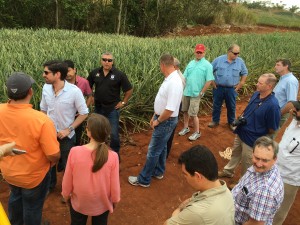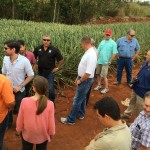TGSA Completes Restructure Process—On April 6, Texas Grain Sorghum Association completed its two-year process of restructuring its board of directors. The association’s governance will now incorporate a delegate body composed of due-paying members throughout the sorghum industry.
“It is gratifying to watch an industry take ownership of self-help programs intended to strengthen our industry and ultimately make sorghum more profitable for producers,” said Dale Murden, President of TGSA.
The newly formed delegate body – made up of Texas producers, elevator managers and corporate members – will now play an active role in TGSA’s operations. Along with representing all regions of the state’s sorghum industry, the delegate body will serve as a pool from which future board members and officers will be drawn. The board of directors is presently composed of ten members (three from each region and one at-large member), with a majority being producers. A survey of the current board and delegate board reveals the association now represents 350,000 acres of production, 265,000 gallons of ethanol production, all major sorghum seed production companies, three elevators, four chemical production companies, and the largest pork production company in Texas. In the coming months TGSA delegates will be assigned to committees ranging from legislative initiatives and regulatory oversight to product innovation and sustainability. In addition to the committee responsibilities, the delegate body will be tasked with approving the TGSA’s annual budget and nominating regional representation to the board of directors. The delegate body will meet as a whole once a year and will have regional meetings intermittently to direct policy and leadership roles. For more information about TGSA’s restructure, governance or membership please contact Patrick Wade at Patrick@texassorghum.org or (512) 788-4599 or Wayne Cleveland at wcleveland@mindpspring.com or (254) 541-5375.

Comptroller Glenn Hegar addresses the crowd during dinner at the first Texas Sorghum joint annual meeting.
TGSA Visits EPA—Patrick Wade joined citrus producers from around the country in a visit to Washington, D.C., last week to discuss crop protection with policymakers and regulatory agencies. The meetings primarily focused on the evolving dialogue between beekeepers and producers regarding the nature and impact of neonicotinoids on the honeybee population. While the group was able to find allies on Capitol Hill who have pledged to defend an empirical approach to pesticide usage, the regulatory agencies were resolute in their insistence that the agriculture industry must do a better job of communicating with the beekeeper groups. While we may disagree with the proportionality of this burden, we are committed to expanding and enhancing our communication efforts moving forward. We were reminded once again during this visit that the single most valuable political asset we have is our story. If we can authentically communicate how chemicals are applied and the personal stake and pride you all have in producing safe crops in healthy environments, then we can preempt activist’s slandering and demagoguery. We encourage you to keep an eye out for upcoming TGSA initiatives to get your story told.
TGSP Hosts Micro Sorghum Seminar—Last week TGSP hosted a micro sorghum seminar in Panama City, Panama. Latin American grain buyers attending the conference heard from swine and beef nutritionists regarding the most effective ways and benefits of sorghum inclusion in feed rations. Texas sorghum producers and elevator managers attending the seminar gave crop outlook and planting progress updates across the state and fielded questions regarding planting intentions for the crop.
“I believe meaningful connections were made during this trade mission,” said Wayne Cleveland, executive director of TGSP. “Latin America, and Mexico in particular continue to be a steadfast market place for Texas sorghum. We greatly value the partnership we have with these buyers and this conference has opened more pathways for grain trade in the future.”
The group had the opportunity to tour the Panama Canal where an expansion is slated to be complete June 26 of this year. The project will create a new lane of traffic through the construction of a new set of locks, doubling the waterway’s capacity. This will allow a huge new increase of barges to go through the Canal and shorten their route by 8000 miles. Currently, about 14,000 ships pass through the Canal yearly—some undoubtedly carrying grain produced by the farmers visiting last week.

Seminar attendees discuss farming practices with the owner of a pineapple plantation outside Panama City, Panama.










